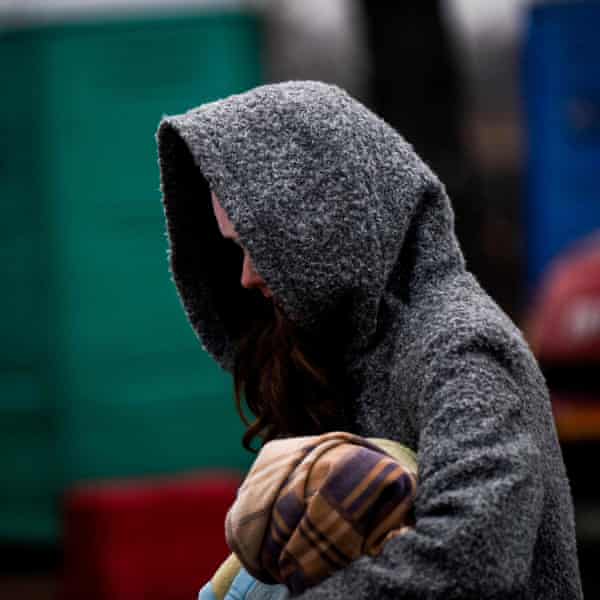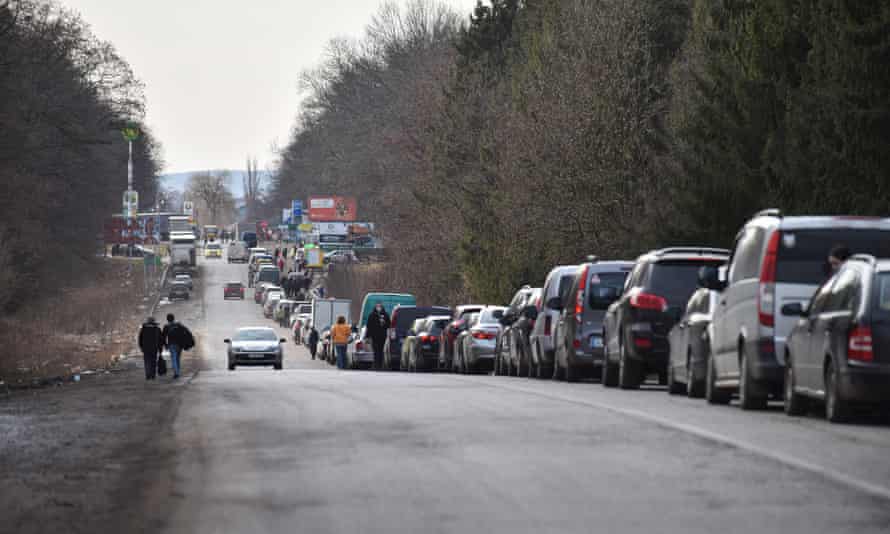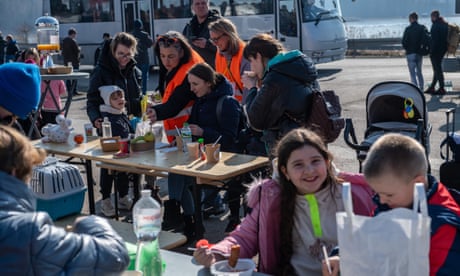Ukrainian refugees wait to board buses outside the train station in Przemyśl, near the Polish-Ukrainian border. Photograph: Angelos Tzortzinis/AFP/Getty
Volunteers patrol Polish border to fill what they say is a dangerous gap in protection for vulnerable refugees
Women and child refugees fleeing the war in Ukraine to Poland are being targeted by suspected pimps and sex traffickers operating alone and in gangs, according to charities working on the border.
“We’ve registered the first cases of [suspected] pimps preying on Ukrainian women near refugee shelter points in Lublin; accosting them, sometimes aggressively, under the guise of offering transport, work or accommodation,” said Karolina Wierzbińska, a coordinator at Homo Faber, a human rights organisation based in the Polish city of Lublin.
“These are not only men,” she said. “There are also women attempting to procure female refugees at bus stations.”
Wierzbińska said there had also been teams of people working together to try to lure women into unidentified cars.
“[We see teams] waiting for people arriving from Ukraine and pretending to offer rides or lodging to women distressed and exhausted from their journey,” she said.

“We’re also seeing multiple couples, typically a male and a female, having travelled to the border by car, attempting to lure women using similar tactics. We intervene in such cases by approaching the person acting suspiciously and asking them to register in our volunteer directory – in response to which they typically run away.”
Since Russia invaded Ukraine in late February, the Polish army – along with firefighters and police – have been on the border at Medyka, Poland’s busiest crossing with Ukraine, to organise and assist the thousands of refugees arriving every day.
The past few weeks have also seen the arrival of groups of men in military fatigues who claim to be there to protect women and children crossing the borders after aid organisations expressed fears that the refugee crisis would spark a wave of trafficking and exploitation.
Earlier this week, one such group of foreigners in camouflage could be seen unloading aid donations in a Medyka car park.
But the men, who slept in the car park in tents in sub-zero temperatures, are not Polish soldiers. Instead, they identified themselves as veterans of the French Foreign Legion.
The men said they had travelled thousands of miles to fill what they see as a dangerous vacuum in protecting women and children fleeing the war in Ukraine from trafficking.
“I couldn’t even focus, because that could have been my sister, my daughter,” said one individual attached to the vigilante group, who asked not to be identified but showed what appeared to be French Foreign Legion ID papers in his passport. “I think nothing’s being controlled,” he said. “I’ve seen women who are scared, and kids are showing up at the border and no one knows where the parents are. It’s such an easy target.”

“The issue with human trafficking is that most of the transports that happen are not organised. They are volunteers who arrive from all kinds of places in their private cars. So at all the reception points, you have different organisations trying to set up a system of tracing and tracking,” said one Polish Red Cross volunteer, who asked to speak anonymously in order to be candid.
A spokesperson for the local police said they had no information about the vigilante group or their intentions, but denied there were any foreign soldiers at the border.
Volunteers at other refugee reception centres have also seen men in military uniforms unaffiliated with any official authority. On top of an already chaotic mix of aid groups, authorities and local volunteers, the arrival of individuals in military clothing creates confusion over who the official security forces are at the border points – a situation that helps traffickers, experts point out.
Many of the men refused to answer questions about their presence at the border. One individual, who had a French flag on his uniform, kept his face partly covered by a black neck gaiter and refused to give his name or explain his purpose at the border, only saying that he was there “to help”. All the men refused to be photographed.
Unicef, one of the aid groups working in Poland, said unvetted individuals acting in isolation from the Polish authorities were a concern. “I can’t speak for the authorities in Poland … [but] security is effectively their domain,” said Joe English, a Unicef spokesperson. “I think any kind of vigilantism is an unnerving development.”
More than 3 million people have fled Ukraine since the Russian invasion. Charities working at the border have said the increasing desperation of the women and children who are crossing over, many of whom have nowhere to go, has coincided with the appearance of suspected traffickers and sexual predators.

Ylva Johansson, EU commissioner for home affairs, said this week that there had been reports from aid groups of women disappearing and that the European Commission had launched a network of anti-trafficking coordinators. “We should not wait until we have proof of a lot of trafficking, because then it might be too late,” she said.
Missing Children Europe, an umbrella group for 24 child-protection organisations across Europe, told the Guardian that unaccompanied minors were continuing to disappear at the borders.
“There are so many children […] that we lost track of,” said Aagje Ieven, secretary general of Missing Children Europe. “This is a huge problem, not just because it means they easily go missing, and are difficult to find, but also because it makes trafficking so easy.”
According to Unicef, more than 500 unaccompanied children were identified crossing from Ukraine into Romania between 24 February and 17 March. It is one of several organisations that has called for improvements to screening at borders to keep children, particularly unaccompanied ones, safe.
